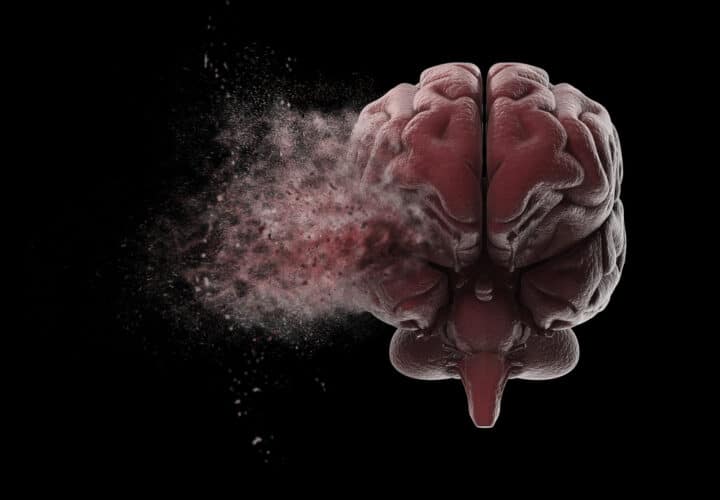Dementia causes memory loss and deteriorates the ability to carry out everyday tasks over time, but sometimes the most distressing thing to experience is how the disease alters personality.
Aggression, agitation, paranoia and hallucinations are common symptoms of the disease that are as distressing to patients as they are to the loved ones trying to accommodate and manage their symptoms. But what happens in the brain that changes personality? And how can caregivers control behavioral symptoms in a way that’s most comfortable for the person with dementia?
We spoke to Dr. Bruce Miller, M.D., a behavioral neurologist at the University of California, San Francisco about the relationship between the brain, behavior and different types of dementia.
- Behavioral symptoms like anxiety and introversion may appear much earlier than a diagnosis
- Research shows that caregivers experience a spike in serious illness when caring for someone with dementia
- Sundowning, hallucinations and other strange behavior can often be traced to environment issues or tiredness
Being Patient: We get so many questions about how dementia impacts behavior—perhaps is the hardest part for caregivers looking after their loved ones. What is happening inside the brain to change behavior?
Dr. Bruce Miller: I think it’s really a very important question that has been neglected in research. We have had a single-mindedness about Alzheimer’s disease, and have focused primarily on the memory problems. But the memory problems may not be the biggest issue for a family. Often there are behavioral changes associated with Alzheimer’s disease, even in the fairly early stages.
One of the things that is becoming clear is that the hippocampus, where Alzheimer’s begins, is not only important for memory; it also affects anxiety. It is very common to see a patient with early Alzheimer’s disease, sometimes even before they’ve manifested a memory disorder, to be anxious, hyper-reactive and very concerned about things that are going on around them. Sometimes that’s an incredible burden to the caregiver.
As the disease progresses, behavior almost always becomes part of what we face. So as a loved one loses their cognitive functions, we often hear about severe anxiety and agitation. Irritability is extremely common in people with Alzheimer’s disease. And as the disease progresses, even things like hallucinations, delusions, or false beliefs become common.
Delusions sometimes occur about the loved one and their face. “This is not really my wife, this is an impostor,” they’ll say. And this is extremely hard to manage, and also extremely difficult for caregivers to face. It’s probably the biggest part of the burden of Alzheimer’s disease. It isn’t the memory, per se. It’s these behaviors that emerge.
As the disease progresses, this is almost invariable. It’s the biggest factor in determining caregiver health, and also a huge factor in a family deciding to place their loved one [in a memory care home].
Being Patient: Alzheimer’s disease obviously presents itself first in the hippocampus. When we talk to people who have loved ones who are suffering from FTD, or frontotemporal dementia, the first thing they notice is not necessarily memory problems, but behavioral problems. With FTD, the frontal lobe is affected, which is more responsible for behavior. If people with Alzheimer’s have earlier displays of behavioral changes, then how much do we know about where behavior is controlled inside the brain?
Dr. Bruce Miller: That’s a great question. I think in Alzheimer’s disease, the behavior may be quite normal for long periods of time, and in frontotemporal dementia, that’s never the case. In frontotemporal dementia, which begins in the frontal lobes and the anterior temporal lobes, we are seeing bad behaviors, way before memory loss. And the behavior is different from what we see in Alzheimer’s. We see disinhibition. People commit antisocial behaviors and crimes. They are profoundly apathetic, hardly move from in front of a television. They overeat. They develop repetitive motor behaviors, like drinking Cokes over and over again, collecting napkins.
The behaviors of FTD are very different from those of Alzheimer’s, and that’s because the anatomy, like you say, is different.
Being Patient: What are the earliest verbal signs of brain disease? For example, aphasia is oftentimes associated with strokes. Are there earlier verbal signs with Alzheimer’s?
Dr. Bruce Miller: Absolutely, the answer is yes. When [scientists] focused in the ’80s and the ’90s on memory, we missed this story about language. And we now know that there are forms of Alzheimer’s disease that begin with trouble with naming—known as logopenic aphasia. These are people who don’t present necessarily with memory problems, but they’re struggling to find the right word. When they talk to someone, they are going in circles around words that they can’t find. And then eventually, the speech becomes what we call empty. They say a lot of words, but they’re not communicating very much.
And again, this is geography of the brain. This happens when Alzheimer’s disease starts on the left side of the brain in naming areas. When frontotemporal dementia starts on the left frontal lobe or left anterior temporal lobe, we also get strong language presentations.
Being Patient: Is there any evidence behind non-drug approaches like reiki or CBD oil to help behavior? What about CBD oil?
Dr. Bruce Miller: I would say definitely. But we always start with questions about the environment first. What is the environment around that person? What are the triggers for bad behaviors? Can we change the environment? Can we change the triggers? Is this person only problematic when they go into an elevator because they touch everyone in the elevator? That’s a simple one. You don’t bring them into elevators, or you bring them into elevators by themselves. Thinking very carefully with a family about the environment of their loved one when you think about non-medicine based approaches, is incredibly important.
In our research at UCSF, we have learned that we, to some degree, can predict caregiver distress just based on where the brain atrophies. So if this disease begins in the frontal lobes, no matter what the caregivers do, the behaviors are a problem, sometimes a very big problem. And this is sometimes overwhelming and very difficult to deal with.
Absolutely, start with what you can do non-medically. And the truth is, the medicines we have for this are far from satisfactory. One of the things I always tell a loved one when I start working around a behavior is: I’m going to try some things, and first try non-medical—and then I think about medicines that might be helpful. But I always point out that none of these medicines may help the behavior.
This is an area we really need new solutions. I’m excited to hear about CBD. We hear it from patients. This is something that really needs a study. And my guess is, there will be select people who are exquisitely sensitive—in a good way—to this approach, and others where it might be deleterious. Sorting that out is really important so that we can make sure we put the right people on the right medicine.
Being Patient: Is there evidence out there that behavioral strategies do indeed work? For example, we’ve heard that story over and over again: the person with Alzheimer’s says the housekeeper who has been with a family all their lives is suddenly stealing. So what does one do? We’re told all the time to agree and change the subject. Do you fire the housekeeper? What is the behavioral modification in a circumstance like that, and do you find that manipulation can work?
Dr. Bruce Miller: I think distraction is important. Remember that a lot of our patients can’t remember, so what’s very, very upsetting to them at one point is less so at another point. Figure out what the triggers are. Figure out whether maybe one of the new medicines is actually making paranoia worse rather than better. My rule of thumb is: When there’s a sudden behavior change, take a broad look at your loved one. Make sure they don’t have an infection. Make sure that nothing’s changed in the brain.
Interventions help enormously. There’s nothing that works for everyone. Getting the right solution for your loved one may require a lot of your thought and a lot of your hypothesis testing within the home, at the marketplace, in the shopping mall. I find two times out of three, it’s the family that figures this out, not the medical team.
Being Patient: I’ve spoken to researchers before who have said caregivers are really at the front line of this disease. They’re living with the patient; they’re noticing things. Is research getting enough of these data points to really understand if there are patterns?
Dr. Bruce Miller: One of the things that hasn’t been extremely successful is non-invasive monitoring. Where does somebody walk? Where does somebody move in the house? When do they seem to be agitated? I think systematic evaluation of those data points will be part of precision medicine in the future. I think sensors and monitors are going to help us. But keen observations from the caregivers are probably, right now, they most important thing that we get, and we need more of this. And we have to listen as well.
Being Patient: Do personality and behavioral changes become noticeable around the same time that biomarkers, such as the plaques and the tau tangles, become detectable?
Dr. Bruce Miller: In Alzheimer’s disease, the thought used to be that if you had amyloid in the brain, that you are not going to exhibit symptoms until you start to get close to the dementia period. And the mythology is that you don’t have behavior problems until you’re years into the illness.
But Carolyn Fredericks at Stanford just published a study from the Baltimore longitudinal effort. In this study, they looked at people over 15 to 20 years and got personality measures. Carolyn was able to go backwards and think about the personality measures decades before the person actually got sick, and has pointed out that on some of these personality measures—neuroticism and introversion—are early features of the disease.
Behavior precedes the clinical diagnosis of dementia almost always with frontotemporal dementia. These are people who lose their money. They make bad financial decisions. They alienate people around them. They get in trouble at work, not because they can’t remember, but because they’re disagreeable and they don’t follow orders.
With Parkinson dementias, like Lewy Body, there’s often a very strong signal of mood and anxiety. So these are people who, years before they actually develop a motor problem, develop for the first time in their life a major depressive episode, or a huge anxiety disorder that requires medications.
Being Patient: Oftentimes, you’re talking about a caregiver and a dementia patient who are in their senior years. If your team finds that a patient and a caregiver are both really going downhill, what interventions are available to give them help?
Dr. Bruce Miller: That’s something that we focus on from the first visit. We look at the caregiver and often we hear they’ve been saintly in what they’ve done to look after their loved one, and we acknowledge it. We recognize it. Sometimes people in their own community, even family members, will blame them for the problems of a loved one. It’s almost never their fault, and almost always, they have done a superhuman job of helping the patient.
The second thing we talk about is their health. We know 15 percent of caregivers say they get a serious medical illness that they believe is related to caring for a loved one. Fifty percent get a depressive episode. We think the stress and the depression and anxiety might even be a risk factor for brain disease later on. Our interventions are often just as intense for the caregiver as the patient. And it’s also very important to point out, if they don’t do well, the person they love and are caring for will do terribly. It’s almost like on the airplane, when the oxygen bag drops. Make sure yours works first, and then put it on your children.
Being Patient: What is your best advice for caregivers to maintain health?
Dr. Bruce Miller: You must make room for your health. Make sure you don’t have cardiovascular risk factors. Make sure your blood pressure is in the normal range almost all the time. Do what you can to eat a healthy diet. The diets that are rich in fats, that are rich in sugars, processed sugars, are clearly not good for brain health, and they’re not good for heart health either.
Exercise is unbelievably important. We know that if you are a caregiver and are exercising in the bottom quartile, you are much more likely to get dementia yourself. So these are things that we really insist on. Thirty to forty minutes, four times per week.
Being Patient: We get a lot of comments around hallucinations, and strange hallucination, impossible hallucinations. How much do we know about why they are occurring inside the brain with this disease?
Dr. Bruce Miller: I think we have learned that low acetylcholine in the brain is a very important factor. So if your brain acetylcholine goes down, which it does profoundly in the Parkinsonian dementias, you have a tendency to see things that aren’t there.
Being Patient: What is acetylcholine?
Dr. Bruce Miller: Acetylcholine is a chemical that helps your brain to focus. And I think when it’s not working well, all sorts of things flood into your brain. You have trouble processing them. You have trouble knowing what’s real and what is not.
Sometimes people get what we call a delirium. They’re confused. They’re hallucinating, and they’re confused. They can’t attend from one moment to the next. So at least in some people with hallucinations like this, the traditional cholinesterase inhibitors are very helpful.
Being Patient: What do we know about sundowning? Why do the hallucinations or the strange behavior come out when the sun goes down?
Dr. Bruce Miller: It’s still an area that we’re not sure about. But I think if elderly people are not stimulated, if the room is darker, they don’t see as well. They’re tired. Maybe they’re wearing down a little bit toward the end of the day It tends to bring out the worst in them, just like it tends to bring out the worst in little children around the end of the day if they’ve been tired and overstimulated.
A lot of elders are overstimulated to begin with if they have Alzheimer’s or Lewy Body. So it is a struggle for them to get to that late hour in the day when they’re trying to go to sleep, and sometimes, they don’t sleep very well either. So this really exacerbates that problem in the evening.
Being Patient: When a person has a diagnosis or has symptoms of Alzheimer’s disease, there’s nothing really you can do to get your memory back. But on the behavioral side, is there room for repair? If somebody is being irrational, if they are having tantrums, is there a reason to give hope and belief that those could be modified?
Dr. Bruce Miller: I always assume that if we modify the risk factors for that acute deterioration, the person will return close to where they were before. On the other hand, if people have longstanding, relentless behavioral disturbance, I think it makes it less likely that any intervention is going to dramatically change that. And sometimes the only intervention that will work is placement, where the person is in an environment where the behaviors are not as distressful and can be managed better.
Being Patient: Is it important to have the same routine, give the patient the same expectations? Does that help with behavior?
Dr. Bruce Miller: Very much so. I think a lot of times, families will say, “Can we go to Europe and take a very complicated trip?” And we don’t want to deny people pleasure. But a lot of times often the greatest pleasure, once you start getting Alzheimer’s disease, is in routine and having a world that is predictable.
Sometimes these trips that someone had thought about for many years may not bring the kind of joy that people hope for. Routine is incredibly important. Same time breakfast, same lunch, same dinner.
Being Patient: So there’s obviously a lot more research that has to go into some of these behaviors and deterioration inside the brain. Where we are today with that research and where do we really need to go?
Dr. Bruce Miller: I think definitely we want to be able to diagnose this process as early as possible. If it begins in early adulthood, we want to know when it begins. Some of the approaches use biomarkers, neuroimaging or blood tests that show maybe some disruption of neuronal function. This is a huge focus of our entire field.
As a behavioral neurologist, I think where the disease first manifests is very important. So I want to know: Where in the brain is there dysfunction? Why does dysfunction in that area chemically lead to a behavioral disturbance? Are there chemicals that might modify the chemical anatomy of this disorder?
The biggest thing that we all are excited about is interventions. I don’t think amyloid lowering by itself will be the only answer. We now have tau lowering approaches, anti-inflammation approaches, and I think this field is moving in the direction that HIV did in the 1980s, where one medicine by itself didn’t work, but a cocktail of medicines kept the disease under control. And I think if you asked every leader in our field about where they think the field is going, I think that’s our aspiration.
Being Patient: And really highlighting the importance of taking care of your brain before there’s a problem, right? There are things we know that are good for our brains, so why not do it earlier to prevent a later stage where you become more vulnerable to disease?
Dr. Bruce Miller: Absolutely. And I think we now know that about one-third of dementia is caused or contributed to by preventable things. So cardiovascular risk factors, sleep disturbances, traumatic brain injury—things that as a society we need to think about as protection.
And this, I should add, hits the lower socioeconomic groups the most severely. So the poorer someone is, the more likely they will suffer from one of these preventable components of dementia.
Is pollution important to the development of dementia? This is a worldwide epidemic, and many of us believe that the data’s starting to suggest that pollution is a risk factor for dementia.
So I think as we get more serious about this, we’re going to find more and more risk factors that a society could change.
Being Patient: What are your thoughts on supplements? We spoke last week with a researcher who was looking at turmeric and curcumin and the anti-inflammatory properties and the impact on the brain.
Dr. Bruce Miller: Here’s what I think people should know: big hype, little data. I’m really afraid that there are people that tout all sorts of supplements that have never been studied that probably do more harm than good. I think turmeric, curcumin, is a good thing to think about. The initial trials were negative in this space. I think people should beware of doctors with many supplements to cure your cognitive disorders, because the proof of this is almost negligible.
This interview has been edited for length and clarity.





Great article, very informative, what does someone do if they develop these symptoms, is living alone in a stressful environment & can not find help?
What an excellent interview. Very helpful and practical…can we clone Dr. Miller? :):)
Useful information to an early alzheimer’s patient and family.